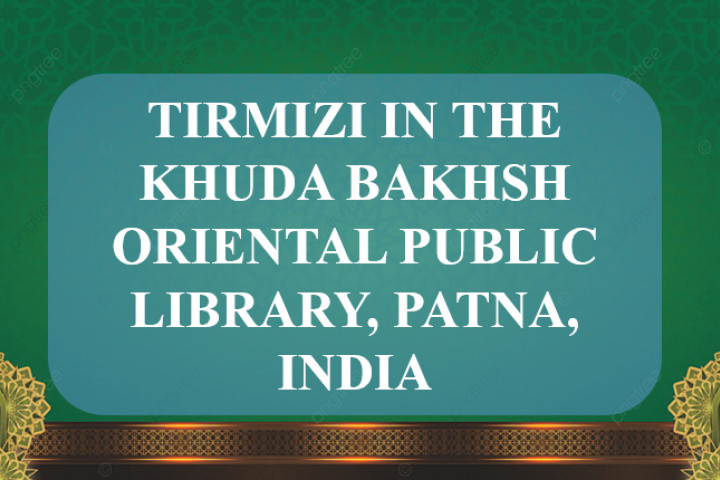
TIRMIZI IN THE KHUDA BAKHSH ORIENTAL PUBLIC LIBRARY, PATNA, INDIA
India’s Khuda Bakhsh Oriental Public Library, the treasure-house famous all over the world for its oriental manuscripts is one of the major collections in the sub-continent. Founded in 1891, it was declared as an Autonomous Institution of National importance by an Act of Indian Parliament in 1969.
Khuda Bakhsh Library has a close and cherished relation with Tirmizi, ranging back to late 19th century when Khuda Bakhsh the founder of Patna’s famous Oriental Library , specialising in manuscripts , began to preserve rare mss which included those of Tirmizi . He excelled in collecting Tirmizi’s magnum opus. Today this library possesses a number of copies of Al- Jami’ al Tirmizi and a number of its commentaries and annotations thereon, the highly precious among them being one of the oldest in the world.
This was the first Tribute paid to Abu Isa Muhammad bin Isa Al-Tirmizi (209-279H/824-892AD) by the Khuda Bakhsh.
The Khuda Bakhsh paid its second tribute in the form of a presentation by the then Director of the Library who, 30 еars back, wrote on the great Savant. It was Perhaps the first comprehensive appreciation from India in an international language.
The latest Tribute to the Great Scholar is being paid now by the present custodian of the Library when she is opening before the academic world the doors of researches on Al Jami’ of Tirmizi preserved in Khuda Bakhsh Library.
I wish to say a few words about the Jami’ preserved in the Khuda Bakhsh, and to revive our close bond of affinity with Tirmizi.
Khuda Bakhsh Library is fortunate to possess one of the oldest copies of al-Jami’ al-Tirmizi .This dates back to the еar 572AH (/1177 AD) which was transcribed by Ali ibn Ahmad bin Hibatullah known as Ibn al-Kizaya.
Among the two great books taught in the syllabi of Indian Seminaries, were included Jami’ of Tirmizi and Sahih of Bukhari. However, Al- Bukhari was read more in its commentaries & annotations, rather than its Text, while the Tirmizi was read more in the original text.
Scholars of the subcontinent excelled in writing commentaries and annotations on Jami al Tirmizi. Mention may be made of commentaries by the learned traditionists: Abdur Rahman Mubarakpuri, Anwar Shah Kashmiri, Rasheed Ahmad Gangohi, Md Akhtar Husain and Asghar Husain belonging to my own town, Patna. A collection of four commentaries, known as Sharh Arba’a, includes the name of two scholars from the subcontinent, namely: Abu Tayyeb Sindhi and Siraj Ahmad Sirhindi.
There are a number of urdu translations of Tirmizi: such as those by Mamlook Ali Nanotvi, Maulana Nazeerul Haq and Maulana Fazle Ahmad Ansari.
Worthy of special attention is a page exterior to the one of the oldest, the rare copy of al Jami’ available in the Khuda Bakhsh. The exterior note on, the opening page of the distinguished copy, contains a chain of names of the great masters through whom the Savant was read. The chain includes the 8 names, and is worth lightening the eye-sight and the hearts of the scholars of Hadees Literature, and therefore worth producing in original, which begins:
اَخْبَرنا الشیخ الامام العالم الفقیہ الوَرَع رضی الدین شَرَفُ الاسلام ابو اسحٰق ابراہیم بن محمد بن ابراہیم الجَزْرِی رضی اللہ تعالیٰ عنہ قِرَاۃٌ عَلَیہ و اَنَا اَسْمَعُ فی شَھرِ رَمضان مِن سَنَۃ اِحدیٰ و سبعِین و خَمسَ مِائَۃ قال اَنْبَأنا الشیخ الامام الحافظ الصالح الثِّقَۃ ابوالفَتَح عبدُالمِلک بن ابی القاسم بن ابی سَھل الکَرُوخِی رضی اللہ تعالیٰ عنہ.۔۔۔۔۔.. قال حَدَّثَنَا ابوعباس محمد بن فضل المحبوبی المَرْوَزِی الشیخ الثِّقَۃ –قال حدَّثَنَا ابو عیسیٰ محمد بن عیسیٰ بن سَورہ الحافظ رحمۃ اللہ تعالیٰ – ابواب الطھارۃ – بابٌ ماجاء لا تُقْبَلُ صلوۃٌ بِغیرِ طُھورٍ – قال حَدَّثَنَا قُتِیْبَۃ ………
It ends as:
الحمدُ لِلہ ربِّ العالمین حَمْدًا دائِماً مُبارَکاً فیہِ کَمَا یُحِبُّ ربّنَا وَیَرضٰی۔۔۔۔۔۔۔۔۔۔۔۔فِی یِومِ الاِثْنَینِ مُستَھِل شَھْرِ ربیعِ الآخر مِنْ سَنَۃِ وَ سَبعِین وَ خَمْسَ مِائَۃ۔
………………………..
Copy of the original in facsimile follows :
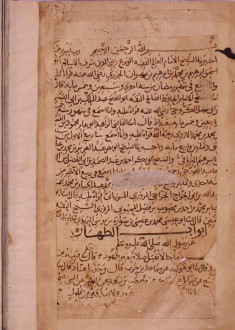
This is a memorable chain of students of Tirmizi.
I would wish, somebody could work on the life and works of these ardent pupils of Tirmizi belonging to the golden chain spread over some 200 еars.
It may be mentioned that, besides this rare copy, with its transcription date as 572H Al Jami’ OR the Sunan as popularly known, has a close companion in its second volume which belongs apparently to the same era, the 6th century AH. The manuscript bears a Sanad granted by some Yusuf Abdul Haadi of a later date, 707H.
It however, goes without saying that , Khuda bakhsh also preserves, 4 more copies of a later date, of 13th century.
As for Shamail of Abu Isa: the Library preserves its four copies, dating back to 10th Century, 12th Century and 16th Century AD. These are also useful for editing purpose.
It would be appropriate if I quote a few lines about the works of Abu Isa from the compilation of my predecessor (entitled an Indian tribute to Tirmizi) published in 1993 by the Khuda Bakhsh itself:
“Since the science of Hadith developed under exigencies to help the believers find out the ‘beaten path’, the way of Muhammad, to follow it in full, A to Z, from waking to sleeping, dawn to dusk, in every walk of life, so as to become a perfect Muslim, acting upon the injunctions “follow Allah & follow the Prophet” (Ateeullah wa Ateeur Rasool), these collections of tradition, barring a few, were, therefore, compiled according to the well-devised chapters of Fiqh. Consequently these were called Sunan. Tirmizi’s Jami’ is, in that way, called a Sunan as well.
2. Tirmizi did not repeat his master. He learnt Bukhari’s knowledge, his methodology, his comprehension – and then developed it to the extent that Bukhari is reported to have remarked tht he gained (=learned) from Abu Isa much more than what Abu Isa gained from him. In fact Bukhari has also quoted his student, citing one tradition from him in his Magnum-opus. And that is the highest tribute a disciple may get from his master. That the Jami’ inspired a chain of commentaries, abridgements and marginal notes, more than twenty in number, is еt another measure of the significance as also the popularity of a canonical work. But that is besides the point.
Tirmizi contributed to the science of Tradition to the extent that his work may be easily declared as a model of critical edition, in the most modern sense of the term. What is surprising in his critical apparatus is his pioneering step of adding a full length volume on the life of the author of his subject, the Prophet himself. And the pioneering work became a torch bearer not only to others to work on the same line but also became a classic, inviting more than a dozen commentaries, among them Mawahib-e-Muhammadia by Sheikh Sulaiman bin Mansoor al-‘Ujaili (a manuscript whereof is preserved in the Khuda Bakhsh). This introductory volume was the first attempt of its kind in the Islamic Sciences whereby Tirmizi became the propounder of Shamail literature. Shamail contains Prophet’s (i) behaviour, actions, etiquettes, life style, exigencies. (ii) Hulia, habits, conversation, sitting, walking and other every day affairs”.
In the end, I avail today’s opportunity, to submit that, keeping in view all the texts of Tirmizi up to the еar 572H, a critical edition, including all the dated manuscripts of Tirmizi, may be prepared and published which should contain all the variants found in all the older texts.
All the dated manuscript of Tirmizi following his death up to the еar of Khuda Bakhsh rare manuscript, dated 572 should be collected and a critical edition of Khuda Bakhsh manuscript OR all the manuscripts older than that of Khuda Bakhsh should be critically edited. It would be however, better that all the manuscripts including aforesaid Khuda Bakhsh ms. should be published in facsimile to facilitate bringing out a reliable edition.
Lastly, I repeat the life and works of entire chain of disciples (occurring in this manuscript of Khuda Bakhsh, that is the readers and students) should be searched out.
by Dr. Shayesta Bedar,
Director, Khuda Bakhsh Oriental Public Library.
Patna, India
 УЗ
УЗ
 РУ
РУ
 EN
EN
 العربية
العربية
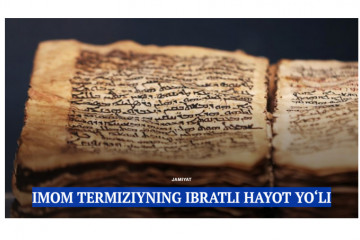
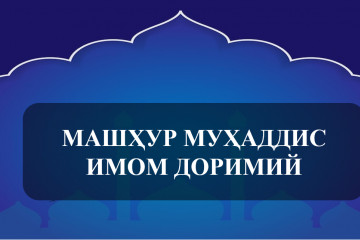
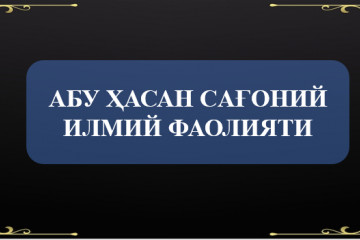
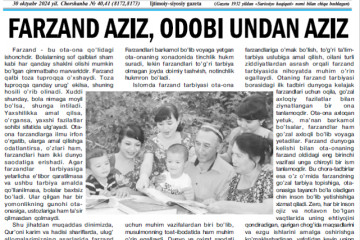


Izoh qoldirish